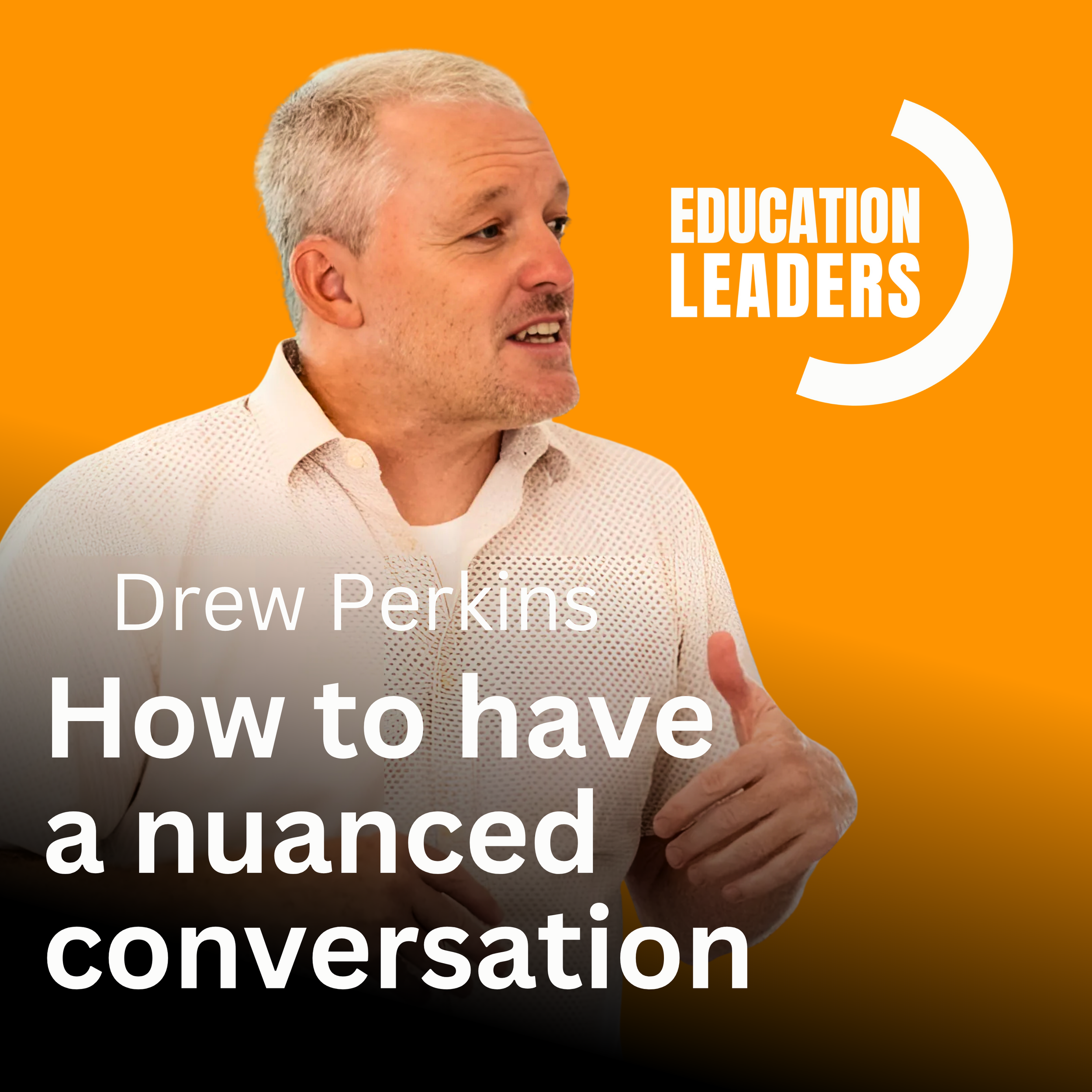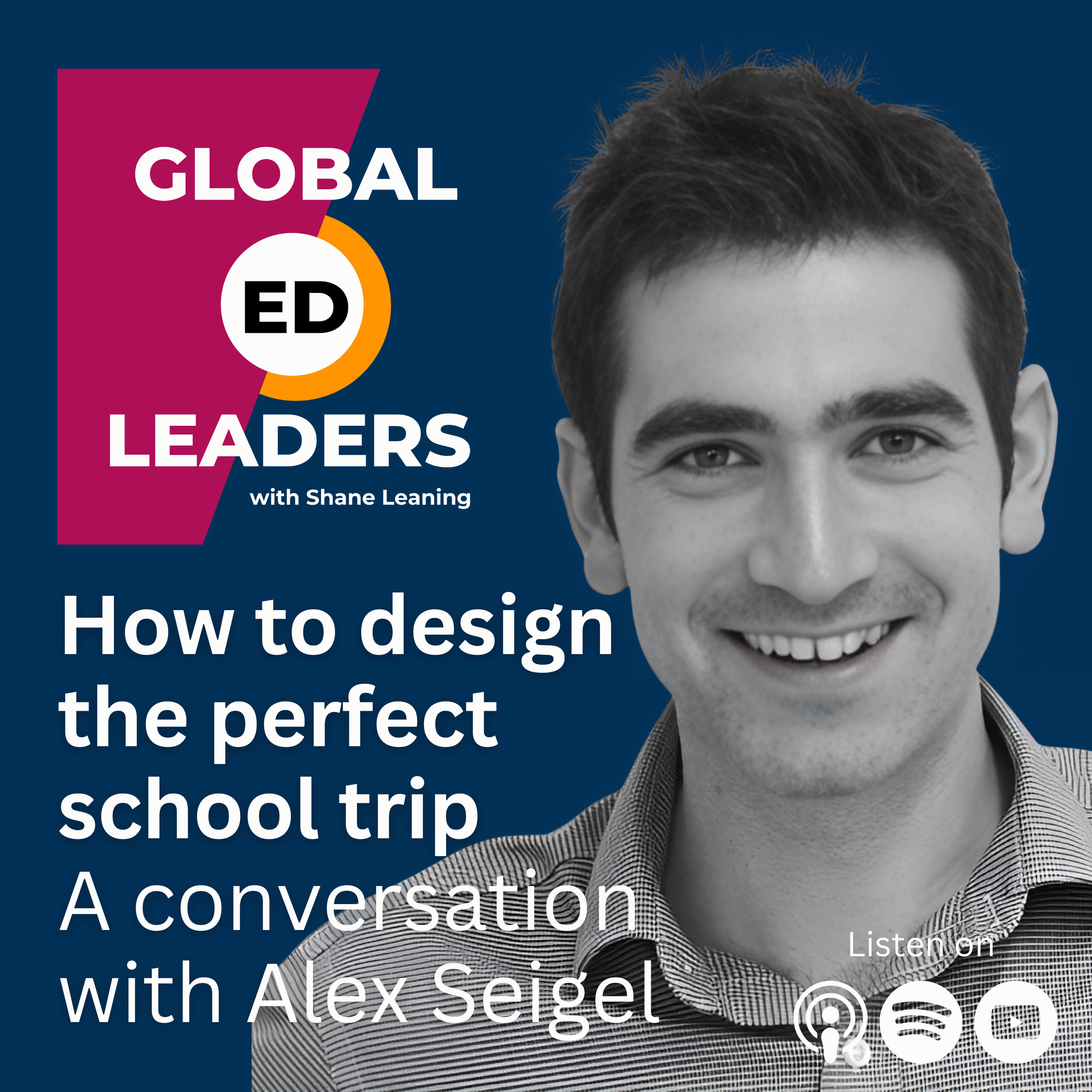Impactful interviews with renowned thought leaders and deep-dives in to school trends and strategies from around the world, to support you in your school leadership journey.
EDUCATION LEADERS has topped the School Podcast charts in countries across the world* and is in the top 5% of all podcasts globally*.
*#1 podcast in Apple Podcast Charts in Hong Kong, Ireland, April 2024, Top 5% data from ListenNotes in 2025
Tune in every week:
Teaching Primary Children Where They Are
In this essential episode for school leaders, Shane explores primary education leadership with Emma Turner, a primary education expert with over 25 years of experience in school leadership development. Emma challenges the common practice of applying secondary-focused approaches to primary settings, sharing practical school leadership strategies that respect how young children actually learn. This conversation offers valuable education leadership training for international school leaders who want to improve their understanding of age-appropriate pedagogy and effective transition processes between educational phases.
Why Teachers Resist your Great Ideas
Ever wonder why brilliant educational ideas don't always translate into classroom reality? In this conversation, Shane Leaning sits down with author Chris Youles to explore the messy truth about implementing change in schools and why sometimes it's easier to influence other people's schools than your own.
How To Learn From Everyone
Shane Leaning chats with Ben Whitaker about his new book "The Ideas Guy" and why he thinks we're all capable of being idea generators. Ben's an education consultant who specialises in education leadership training and co-hosts the Edufuturists podcast, and he's got some fascinating takes on school leadership coaching. Rather than hunting for that perfect role model (spoiler alert: they don't exist), Ben's all about picking and mixing ideas from loads of different people - even the ones with questionable ethics.
Leading With Conviction
Katharine Birbalsingh, founder of Britain's most talked-about school, reveals the leadership principles that transformed her vision into reality. From her converted office building in London, Michaela Community School has achieved the highest progress scores in England for three consecutive years, with results that rival the country's most elite institutions.
What Makes Teachers Tick?
Shane challenges the common assumption that all teachers must be primarily motivated by their love of children. Drawing from research and personal reflection at the Festival of Education, he explores the diverse motivations that actually drive educators - from technical craft enthusiasts to social justice warriors to stability seekers. Using the 2007 Watt and Richardson "FIT-Choice Scale" study, Shane identifies six different types of motivated teachers and explains why understanding these differences is crucial for effective school leadership.
How to have a nuanced conversation
In this episode, Shane sits down with Drew Perkins, President Director of ThoughtStretcher Education and host of the ThoughtStretchers Education Podcast. Drew brings a refreshing perspective on how we can navigate the often polarised world of education discourse, from the direct instruction versus inquiry debate to the broader challenge of maintaining nuanced thinking in our schools.
Should Schools Teach Gaming?
When 89% of a population plays games and two-thirds are under 35, that's not a problem to solve - it's a medium to embrace. Today we explore a fascinating partnership between Stanford University's Human Perception Lab and Saudi Arabia's Crown Prince School, where gaming isn't just motivation - it's pedagogy. Dr. Khizer Khaderi (Stanford University) & Dr. Steffen Sommer (Misk Schools, Saudi Arabia) challenge everything we think we know about digital natives, revealing how we're systematically "un-teaching" natural curiosity and forcing students to live in two worlds: digital at home, analogue at school. From Pokemon champions attending Ivy League universities to students learning astrophysics through gameplay, this conversation reveals why the future of education lies not in dragging students back to the 20th century, but in meeting them where they already are.
The Hidden Science of Human Values
Shane Leaning sits down with Ruth Taylor from the Common Cause Foundation to explore the fascinating world of human values and what they mean for school leadership. Ruth shares insights from decades of social psychology research that challenges everything we think we know about motivation.
Rethinking feedback
Shane welcomes globally renowned educator Ross McGill, known worldwide as Teacher Toolkit. Ross shares his groundbreaking approach to feedback and assessment, challenging traditional marking practices and offering practical alternatives that can transform how schools approach feedback while reducing teacher workload.
The problem with grades
Shane Leaning speaks with Amarbeer Singh Gill and Jennifer Curran from Ambition Institute about assessment in education. The conversation challenges our reliance on grades and numbers, exploring the limitations of traditional assessment methods and offering insights into more meaningful approaches to understanding student learning.
Supporting Men in Schools
Ryan Parke (The Men's Coach) shares his personal experience with the suicide of a friend and explores the complexities of male mental health. He discusses the common belief that men don't talk about their feelings, which he challenges. Ryan and I particularly delve into the role of testosterone in men's health, debunking myths about its effects and emphasising the importance of lifestyle factors such as sleep, diet, exercise, and sobriety in maintaining healthy testosterone levels. He provides practical advice for improving men's health and wellbeing, ultimately advocating for a more nuanced understanding of male mental health issues.
School Vs. Tutor
When some families see tutoring as non-negotiable and others as a last resort, how should international schools approach this complex topic? Sarah Capewell (founder of Aster Academy) and Arthur Moore (Professional Tutor of the Year 2024) unpack the challenges and opportunities around tutoring in international education.
Invisible Obstacles, Unstoppable Women Leaders
In this conversation, Claire Peet discusses the challenges women leaders face in international education. We explore how common leadership terms like 'imposter syndrome' and 'perfectionism' have become problematic labels that can be used against women leaders. Claire shares powerful insights about the double bind women face - being criticised both for adopting and rejecting traditional leadership traits.
LGBTQ+ Inclusion in International Schools
Ian Timbrell and Shane Leaning talk about range of topics related to LGBTQ+ inclusion in schools, including the challenges faced by school leaders, the importance of representation in literature, and strategies for handling difficult conversations. The discussion highlights the need for inclusive practices and the impact of local representation on students' identities and experiences.
How to Develop Wellbeing in your School
Shane and Aimee explore well-being in schools. Aimee shares her passion for well-being and how it started during her early years in school leadership. They discuss the importance of both feeling good and functioning well in order to achieve well-being.
Rethink your literacy strategy
Chris Scorer, an educational consultant and regular speaker on the international education circuit, shares a transformative and deeply personal perspective on literacy. We discuss how overly narrow definitions of literacy and an unyielding drive towards it can have detrimental effects on students, especially those with dyslexia or other literacy difficulties. Chris suggests a radical rethinking of our literacy strategies, advocating for broader frameworks to access and express knowledge that caters to individual learning needs.
7 Principles to Strengthen your Leadership
In this episode, I explore principles that can guide every international school leader. As educators, we are public servants, and it's crucial to reflect on the values that drive our work. Are we truly acting in the best interest of our students?
I break down the Seven Principles of Public Life, also known as the Nolan Principles, and challenge you to consider how they apply within your school setting.
How to design the perfect school trip
I talk with Alex Seigel on how educational trips are a valuable part of a school's curriculum, providing students with transformative experiences and fostering intercultural understanding.
And a great trip includes a balance of key sites and unique experiences, tailored to the interests and educational goals of the students. Adventure leaders and local experts play a crucial role in organising and guiding the trips, providing insights into the destinations and facilitating connections with local communities.
These trips can have a long-lasting impact on students' lives and careers, and it is important for schools to assess and measure this impact. Overall, educational trips offer a powerful way to enhance learning and broaden students' perspectives.
The UK Election and the local/systemic change debate
In this episode, I muse on the recent UK general election and its implications for education. With the Labour Party's victory and Keir Starmer becoming Prime Minister, there’s a palpable sense of hope and excitement among many educators. I discuss my observations from the Festival of Education and reflect on how schools might navigate these changes.
Beyond Consultants and Quick Fixes
In this special episode, host Shane Leaning shares a recording from a session he co-presented with Efraim Lerner at the Festival of Education in the UK. They discuss their new model for driving organisational change in schools from within rather than relying on outside consultants and experts.





















